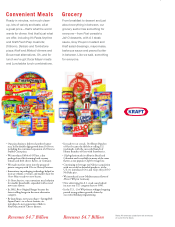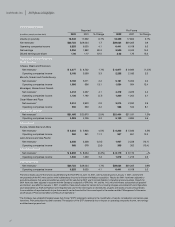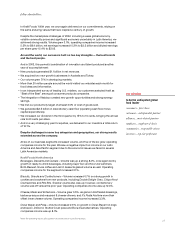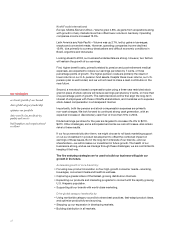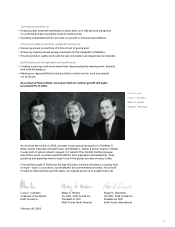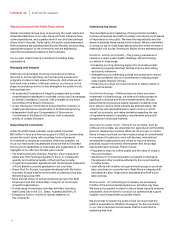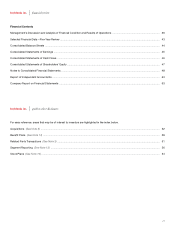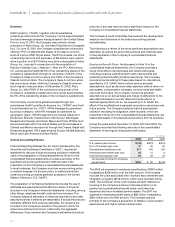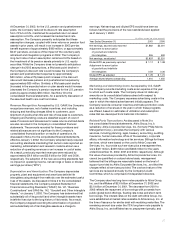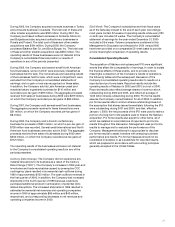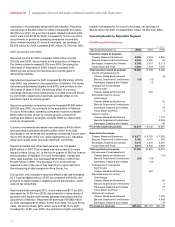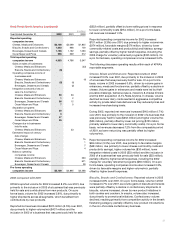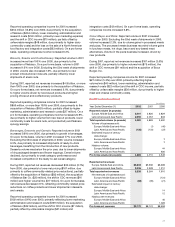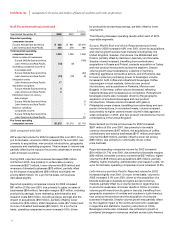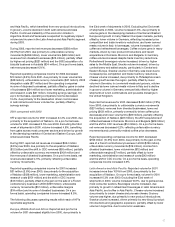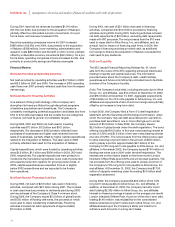Kraft 2002 Annual Report Download - page 33
Download and view the complete annual report
Please find page 33 of the 2002 Kraft annual report below. You can navigate through the pages in the report by either clicking on the pages listed below, or by using the keyword search tool below to find specific information within the annual report.
During 2002, the Company acquired a snacks business in Turkey
and a biscuits business in Australia. The total cost of these and
other smaller acquisitions was $122 million. During 2001, the
Company purchased coffee businesses in Romania, Morocco
and Bulgaria and also acquired confectionery businesses in
Russia and Poland. The total cost of these and other smaller
acquisitions was $194 million. During 2000, the Company
purchased Balance Bar Co. and Boca Burger, Inc. The total cost
of these and other smaller acquisitions was $365 million. The
operating results of these businesses were not material to the
Company’s consolidated financial position or results of
operations in any of the periods presented.
During 2002, the Company sold several small North American
food businesses, some of which were previously classified as
businesses held for sale. The net revenues and operating results
of the businesses held for sale, which were not significant, were
excluded from the Company’s consolidated statements of
earnings, and no gain or loss was recognized on these sales.
In addition, the Company sold its Latin American yeast and
industrial bakery ingredients business for $110 million and
recorded a pre-tax gain of $69 million. The aggregate proceeds
received from sales of businesses during 2002 were $219 million,
on which the Company recorded pre-tax gains of $80 million.
During 2001, the Company sold several small food businesses.
The aggregate proceeds received in these transactions were
$21 million, on which the Company recorded pre-tax gains of
$8 million.
During 2000, the Company sold a French confectionery
business for proceeds of $251 million, on which a pre-tax gain of
$139 million was recorded. Several small international and North
American food businesses were also sold in 2000. The aggregate
proceeds received from sales of businesses during 2000 were
$300 million, on which the Company recorded pre-tax gains of
$172 million.
The operating results of the businesses sold were not material
to the Company’s consolidated operating results in any of the
periods presented.
Century Date Change: The Company did not experience any
material disruptions to its business as a result of the Century
Date Change (“CDC”). The Company’s increases in 1999 year-end
inventories and trade receivables caused by preemptive CDC
contingency plans resulted in incremental cash outflows during
1999 of approximately $155 million. The cash outflows reversed in
the first quarter of 2000. In addition, the Company had increased
shipments in the fourth quarter of 1999 because customers
purchased additional product in anticipation of potential CDC-
related disruptions. The increased shipments in 1999 resulted in
estimated incremental net revenues and operating companies
income in 1999 of approximately $85 million and $40 million,
respectively, and corresponding decreases in net revenues and
operating companies income in 2000.
53rd Week: The Company’s subsidiaries end their fiscal years
as of the Saturday closest to the end of each year. Accordingly,
most years contain 52 weeks of operating results while every fifth
or sixth year includes 53 weeks. The Company’s consolidated
statement of earnings for the year ended December 31, 2000
included a 53rd week. Volume comparisons contained in this
Management’s Discussion and Analysis for 2001 versus 2000
have been provided on a comparable 52-week basis to provide
a more meaningful comparison of operating results.
Consolidated Operating Results
The acquisition of Nabisco and subsequent IPO were significant
events that affect the comparability of earnings. In order to isolate
the financial effects of these events, and to provide a more
meaningful comparison of the Company’s results of operations,
the following tables and the subsequent discussion of the
Company’s consolidated operating results refer to results on a
reported and pro forma basis. Reported results include the
operating results of Nabisco in 2002 and 2001, but not in 2000.
Reported results also reflect average shares of common stock
outstanding during 2002 and 2001, and reflect an average of
1.455 billion shares outstanding during 2000. Pro forma results
assume the Company owned Nabisco for all of 2000. In addition,
pro forma results reflect common shares outstanding based on
the assumption that shares issued immediately following the IPO
were outstanding during 2001 and 2000, and that, effective
January 1, 2000, the net proceeds of the IPO were used to retire a
portion of a long-term note payable used to finance the Nabisco
acquisition. Pro forma results also adjust for other items, all of
which are detailed in reconciliations of reported to pro forma
results throughout this discussion. Management uses pro forma
results to manage and to evaluate the performance of the
Company. Management believes it is appropriate to disclose
pro forma results to assist investors with analyzing business
performance and trends. Pro forma measures should not be
considered in isolation or as a substitute for reported results,
which are prepared in accordance with accounting principles
generally accepted in the United States.
29


